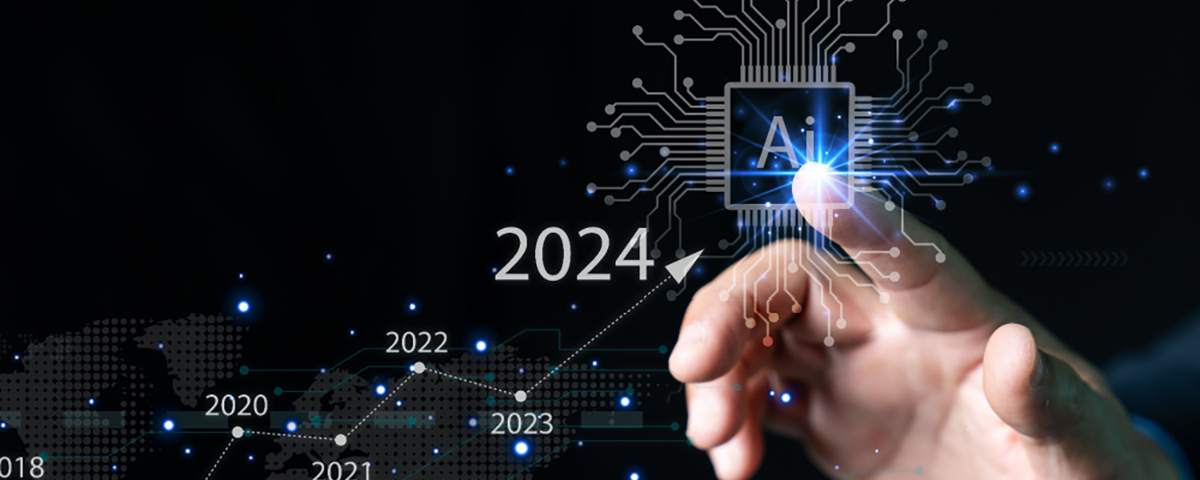Navigating the Digital Landscape: Key IT Trends Expected in 2024
In the fast-paced world of technology, it is essential for businesses to stay ahead of the curve by understanding the latest IT predictions and trends. From the rise of 5G technology to the increasing focus on digital trust, the IT sector is poised for significant advancements and transformations.
In this blog article, we will dive into the top IT trends and predictions for 2024, providing insights into the developments that are set to revolutionize how we approach technology and innovation.
AI
As we move forward into 2024, several key developments are set to reshape the landscape of the industry. One that plays a key role in this new landscape is AI. Artificial intelligence has been a prominent topic for years and most likely will be for years to come.
With advancements in machine learning and natural language processing, AI will play a crucial role in creating better customer service, automating routine tasks, and enhancing decision-making processes in business. With its continuous advancements, AI will likely become even more proficient at processing and analyzing large datasets to provide valuable insights for businesses.
Not only does AI help everyday businesses, but it also helps the job market. In fact, it is predicted that by 2025, AI, machine learning, and automation will create 9% of new jobs in the United States.
What else will we see from AI?
Generative AI has exponentially advanced, revolutionizing industries such as marketing, design, and entertainment. The technology now allows for the creation of realistic and personalized content, enhancing user experiences and streamlining workflows.
In addition, we can expect to see:
- Working with generative AI, we will see more use of customized chatbots
- A collaboration of cybersecurity, AI, and machine learning will allow cybersecurity systems to become more adept at detecting and mitigating potential risks in real-time
- AI is also playing a role in physical security with advancements in encryption and biometric authentication businesses are seeing an enhanced overall security posture
- An increase in IoT-driven AI applications: Smart homes: AI can adjust light and heating based on habits to help save energy and costs, Factories: IoT and AI are used to let sensors predict machine failures to help prevent downtime, Healthcare: AI can be used for wearables, monitoring vitals, detecting illnesses early, and managing treatments
- Multimodel AI is a machine learning model that can process information from a variety of modalities, such as images, videos, sound, and text. Examples include understanding handwritten notes and responding with relevant imagery, personalized learning systems based on human response, or analyzing medical records, scans, and patient descriptions for accurate diagnoses.
Cybersecurity
Just like AI, cybersecurity frequents tech trends lists yearly and 2024 is no different. Cyber security is expected to continue its evolution in response to constantly emerging threats and advancing technology. With the increasing adoption of IoT devices and AI and machine learning, businesses will need to continue to prioritize securing their networks and data.
This year cyber security will focus on enhancing encryption, implementing a zero trust model, and improving identity and access management to better protect against increasingly sophisticated cyber attacks.
5G Connectivity
5G networks were implemented by one in every five mobile network subscriptions by the end of 2023 and we see it continuously grow in 2024. 5G in business is a game-changer, offering unprecedented speed, reliability, and capacity for data transfer. 5G connectivity will revolutionize the way businesses operate by streamlining operations, improving communication and collaboration, enabling real-time analytics, creating a more connected and responsive workforce, and facilitating remote work.

Quantum Computing
Quantum computing is a revolutionary field that utilizes the principles of quantum mechanics to process and store information in a fundamentally different way than classic computing. Unlike traditional computers, which use bits to represent information as either 0 or 1, quantum computers use quantum bits, which can exist in multiple states simultaneously due to the phenomenon of superposition. This allows quantum computers to perform complex calculations exponentially faster, potentially solving problems that are currently impossible for traditional computers.
Moving forward in 2024, quantum computing is being adopted rapidly and as research and development advances, the revenues for global quantum computing are projected to surpass $2.5 billion by 2029 according to statista.com.
Blockchain
Blockchain technology is not a new concept but we are seeing an increase in implementation across businesses in 2024. Blockchain is a decentralized, distributed ledger system that allows for secure and transparent recording of transactions across a network of computers. In this system, each transaction is recorded in a “block” and linked together in a “chain” giving us a blockchain.
This technology has the potential to revolutionize various industries, including finance and supply chain management, by providing an immutable record of transactions. The use of blockchain can bring numerous benefits to a business including:
- Building trust
- Distributing power, permissionless participation
- Improving security and privacy
- Cost reduction
- Improving overall speed and efficiency
- Fostering innovation
- Implementing a transparent payment process
- Creating smart contracts which are self-executing contracts with the terms of the agreement written directly into code
Web 3.0
Built of blockchain technology is Web 3.0, the next evolution of the internet, where advanced technologies such as blockchain, decentralized networks, and smart contracts are utilized to create a more secure and transparent online ecosystem. The main goal of Web 3.0 is that it aims to shift power back to the users, allowing them to have more control over their data and digital identity. It also offers data ownership, easier SEO activities, an increased focus on security, decentralized data storage, enhanced reliability, and democratized access for all.
Digital Trust
Digital trust in 2024 is expected to be a critical factor in shaping the way customers and businesses interact online. With the increasing prevalence of data breaches and privacy concerns, establishing and maintaining trust in the digital realm is imperative. As technology continuously evolves, there will be a greater emphasis on transparent data practices, robust cybersecurity measures, and user-friendly privacy settings. Businesses that understand and prioritize digital trust will likely see increased customer loyalty and satisfaction. On the other hand, businesses that neglect the importance of digital trust may struggle to maintain a positive reputation.

Tech Predictions
Technology will never stop changing and advancing and as we progress, there are some predictions of what is to come. Some 2024 predictions from tech experts are:
- Physical infrastructure investments will rebound
- Data and data storage strategies will be reimagined
- The convergence of 5G and IoT will have incredible benefits for society and business
- Cloud partnerships will continue to dominate
- AI, gaming, and cloud infrastructure are likely to be catalysts for adoption and innovation
- Tech spending is likely to increase by at least 5%
- Renewed importance of data literacy and skills
- A shift in tech priorities to cyber, analytics, AI, collaboration and cloud, networking and automation


